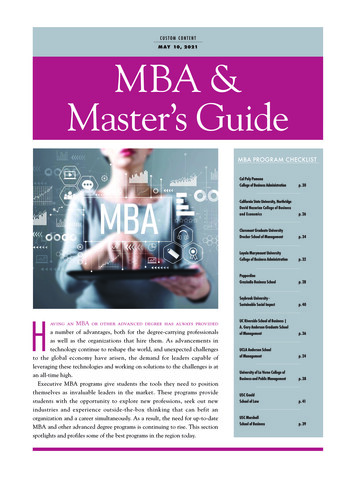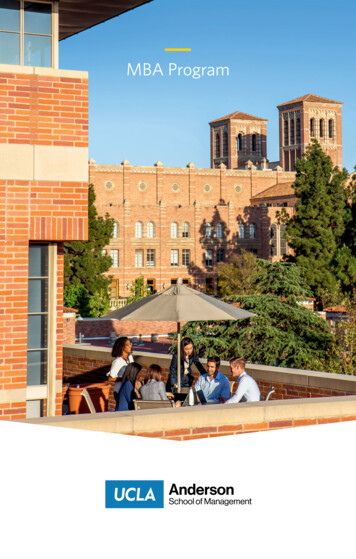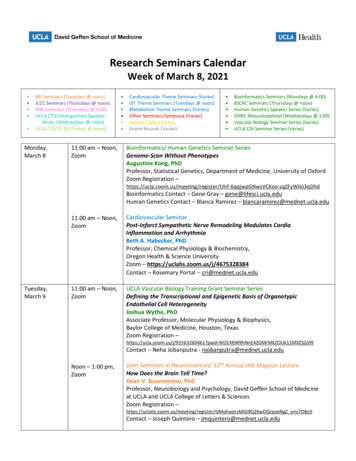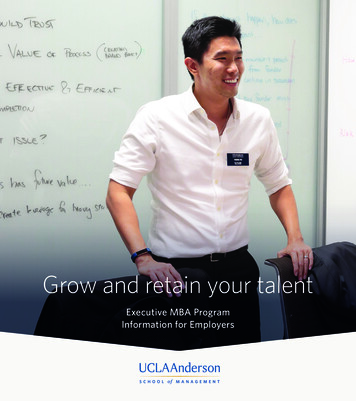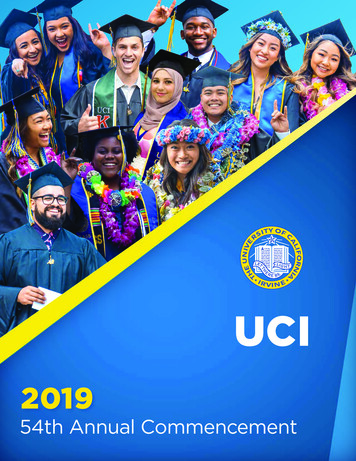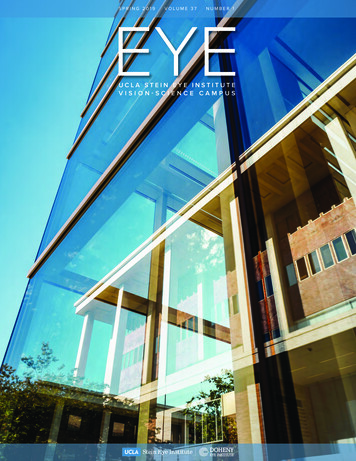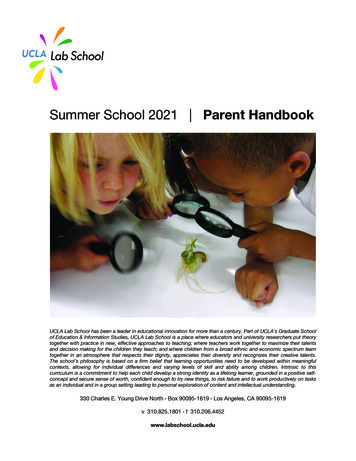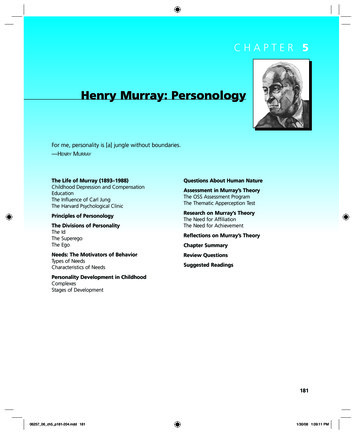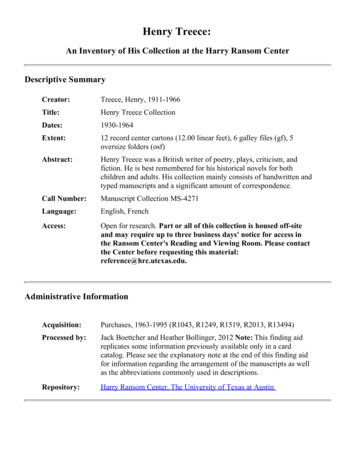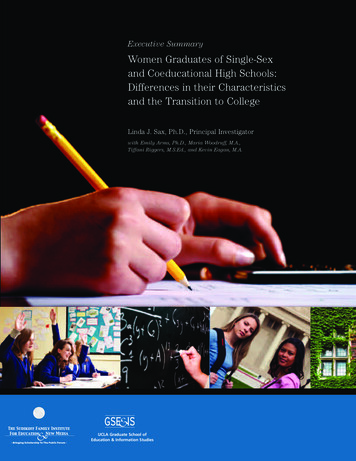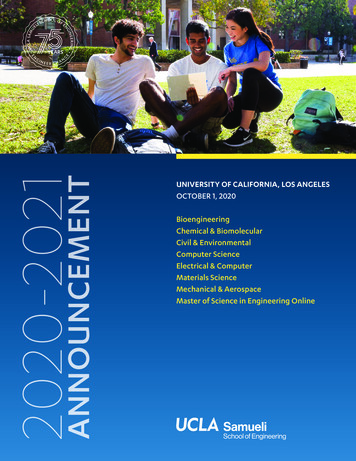
Transcription
2020-2021ANNOUNCEMENTUNIVERSITY OF CALIFORNIA, LOS ANGELESOCTOBER 1, 2020BioengineeringChemical & BiomolecularCivil & EnvironmentalComputer ScienceElectrical & ComputerMaterials ScienceMechanical & AerospaceMaster of Science in Engineering Online
ANNOUNCEMENT 2020-21HENRY SAMUELI SCHOOL OF ENGINEERING ANDAPPLIED SCIENCEUNIVERSITY OF CALIFORNIA, LOS ANGELESOCTOBER 1, 2020
ContentsA Message from the Dean . . . . . . . . . . . . . . . . . .3Henry Samueli School of Engineering andApplied Science . . . . . . . . . . . . . . . . . . . . . . . . 4Nondiscrimination . . . . . . . . . . . . . . . . . . . . . . . . . . 16Harassment . . . . . . . . . . . . . . . . . . . . . . . . . . . . . . . . .17Disclosure of Student Records . . . . . . . . . . . . . . . .17Administrative Officers . . . . . . . . . . . . . . . . . . . . . . . . 4The Campus . . . . . . . . . . . . . . . . . . . . . . . . . . . . . . . . . . 4The School . . . . . . . . . . . . . . . . . . . . . . . . . . . . . . . . . . . 4Endowed Chairs . . . . . . . . . . . . . . . . . . . . . . . . . . . . . . 4The Engineering Profession . . . . . . . . . . . . . . . . . . . . 5Undergraduate Programs . . . . . . . . . . . . . . . . . 19Correspondence Directory . . . . . . . . . . . . . . . . 7Graduate Programs . . . . . . . . . . . . . . . . . . . . . . 26Calendars . . . . . . . . . . . . . . . . . . . . . . . . . . . . . . . 8Master of Science Degrees . . . . . . . . . . . . . . . . . . . . 26Ph.D. Degrees . . . . . . . . . . . . . . . . . . . . . . . . . . . . . . . 26Admission . . . . . . . . . . . . . . . . . . . . . . . . . . . . . . . . . . 27General Information . . . . . . . . . . . . . . . . . . . . . . 9Facilities and Services . . . . . . . . . . . . . . . . . . . . . . . . . . 9Library Facilities . . . . . . . . . . . . . . . . . . . . . . . . . . . . . 9Services . . . . . . . . . . . . . . . . . . . . . . . . . . . . . . . . . . . . 9Fees and Financial Support . . . . . . . . . . . . . . . . . . . . . 11Fees and Expenses . . . . . . . . . . . . . . . . . . . . . . . . . . . 11Living Accommodations . . . . . . . . . . . . . . . . . . . . . . 11Financial Aid . . . . . . . . . . . . . . . . . . . . . . . . . . . . . . . . 11Special Programs, Activities, and Awards . . . . . . . . .13Center for Excellence in Engineering andDiversity (CEED) . . . . . . . . . . . . . . . . . . . . . . . . . . .13Prizes and Awards . . . . . . . . . . . . . . . . . . . . . . . . . . .15Departmental Scholar Program . . . . . . . . . . . . . . . .16Exceptional Student Admissions Program . . . . . . .16Academic Policies . . . . . . . . . . . . . . . . . . . . . . . . . . . . .16Student Representation . . . . . . . . . . . . . . . . . . . . . .16Official Publications . . . . . . . . . . . . . . . . . . . . . . . . . .16Grades . . . . . . . . . . . . . . . . . . . . . . . . . . . . . . . . . . . . .16Published by UCLA Academic Publications, Box 951429, Los Angeles,CA 90095-1429 2020 Regents of the University of CaliforniaUCLA , University of California, Los Angeles , and all related trademarks are theproperty of the Regents of the University of California.All announcements herein are subject to revision. Every effort has beenmade to ensure the accuracy of the information presented in the Announcement of the UCLA Henry Samueli School of Engineering and Applied Science.Admission . . . . . . . . . . . . . . . . . . . . . . . . . . . . . . . . . . 19Requirements for B.S. Degrees . . . . . . . . . . . . . . . . 22Policies and Regulations . . . . . . . . . . . . . . . . . . . . . . 24Honors . . . . . . . . . . . . . . . . . . . . . . . . . . . . . . . . . . . . . 25Departments and Programs of the School . . . 28Bioengineering . . . . . . . . . . . . . . . . . . . . . . . . . . . . . . 28Chemical and Biomolecular Engineering . . . . . . . . 40Civil and Environmental Engineering . . . . . . . . . . . 50Computer Science . . . . . . . . . . . . . . . . . . . . . . . . . . . 62Electrical and Computer Engineering . . . . . . . . . . . 83Materials Science and Engineering . . . . . . . . . . . . 102Mechanical and Aerospace Engineering . . . . . . . .110Master of Science in Engineering OnlinePrograms . . . . . . . . . . . . . . . . . . . . . . . . . . . . . . . . . 126Schoolwide Programs and Courses . . . . . . . . . . . . .128Externally Funded Research Centers andInstitutes . . . . . . . . . . . . . . . . . . . . . . . . . . . . 132Curricula Tables . . . . . . . . . . . . . . . . . . . . . . . . 134Index . . . . . . . . . . . . . . . . . . . . . . . . . . . . . . . . . . 150However, all courses, course descriptions, instructor designations, curriculardegree requirements, and fees described herein are subject to change or deletion without notice. More details on graduate programs are available in variousGraduate Division materials online.Cover: Engineering students in the UCLA campus Court of Sciences, adjacentto the school’s Boelter Hall, three dedicated engineering buildings, and dozensof surrounding science and technology facilities.
A Message from the DeanThe UCLA Henry Samueli School of Engineering and AppliedScience has a long legacy of excellence in education andresearch. We work on the most pressing problems facing oursociety: designing sustainable and resilient communities,developing personalized medicine, advancing artificial intelligence, paving the way for quantum technologies, and unearthing insights from big data.As we enter our 75th year, we welcome a new generationof engineers—with diverse backgrounds from around theworld—to join us as we tackle these and many more compelling issues. Engineering change that will improve our worldrequires not only creativity and skill, but also thoughtfulnessand empathy.UCLA Samueli classes are taught by faculty members who areamong the best in the world in their respective fields. We areproud to cultivate students of all backgrounds, who are creative and motivated, and who bring an exemplary work ethicto their studies.The school offers a rigorous curriculum that pairs strongfundamentals with practical, hands-on experience. Beyondthe core curriculum, UCLA Samueli offers three pivotaladvantages:First, UCLA Samueli isn't just a great school standing in isolation. It is an integral part of one of the world's most innovative cities, and offers unparalleled access to sought-afterinternships and careers. Many leading firms in aerospace,semiconductors, biotechnology and other impactful areasare headquartered in Southern California. The region is alsohome to a major startup scene in which our alumni are involved. In fact, some founded their first startup while at UCLA.Second, in addition to paving the way to careers in industry, we offer unique research opportunities for our undergraduatestudents. They play an active role in our labs, with some research earning course credit. The school features a 9,000-squarefoot makerspace where students can work on personal projects and hold group activities such as hack-a-thons. Our studentsalso often collaborate with the David Geffen School of Medicine at UCLA and other campus disciplines as they pursue newapproaches and breakthroughs.Third, you will meet some extraordinary people among your fellow students. The talent, smarts, outside-the-box thinking andcollaborative, can-do energy at UCLA are unparalleled. If you are interested in exploring fields outside your major, we havemore than 44 engineering clubs focused on a wide range of activities. At UCLA Samueli, we are committed to an equitable,diverse, and inclusive culture and we want everyone to feel welcome in our community.This particular school year presents an unprecedented challenge for all of us, as we continue to adapt to remote instructiondue to the COVID-19 pandemic. We are absolutely dedicated to ensuring the very best possible education and learning experience for all our students. I am grateful for our problem-solving engineers who are resilient, resourceful, and compassionate.Despite the public health crisis, we remain hopeful about our future. UCLA Samueli is in the midst of an extraordinary period ofgrowth, with expansion in the number of research labs, faculty, and students. The school already is world-renowned, but weare reaching for new heights. This growth will offer new opportunities for you to make a significant impact on our society andthe world, and I invite you to be part of it.Jayathi Y. MurthyRonald and Valerie Sugar Dean of UCLA Engineering
Henry Samueli School of Engineeringand Applied ScienceAdministrativeOfficersJayathi Y. Murthy, Ph.D., Professor andDean, Henry Samueli School of Engineering and Applied ScienceScott J. Brandenberg, Ph.D., Professorand Associate Dean, Diversity and InclusionJia-Ming Liu, Ph.D., Professor and Associate Dean, Academic PersonnelHarold G. Monbouquette, Ph.D., Professor and Associate Dean, Research andPhysical ResourcesRichard D. Wesel, Ph.D., Professor andAssociate Dean, Academic and StudentAffairsJenn-Ming Yang, Ph.D., Professor andAssociate Dean, International Initiativesand Online EducationPanagiotis D. Christofides, Ph.D., Professor and Chair, Chemical and BiomolecularEngineering DepartmentBruce S. Dunn, Ph.D., Professor and Chair,Materials Science and EngineeringDepartmentTimothy S. Fisher, Ph.D., Professor andChair, Mechanical and Aerospace Engineering DepartmentEliezer M. Gafni, Ph.D., Professor andChair, Computer Science DepartmentSong Li, Ph.D., Professor and Chair, Bioengineering DepartmentErtugrul Taciroglu, Ph.D., Professor andChair, Civil and Environmental EngineeringDepartmentC.-K. Ken Yang, Ph.D., Professor and Chair,Electrical and Computer EngineeringDepartmentThe CampusUCLA is a large urban university situatedbetween the city and the sea, at the foot ofthe Santa Monica Mountains. Less than sixmiles from the Pacific Ocean, it is borderedby Sunset and Wilshire Boulevards. As thecity has grown physically and culturally, sohas the campus, whose students and faculty members mirror the cultural and racialdiversity of today’s Los Angeles. UCLA isone of the most widely respected and recognized universities in the world, and itsimpact on society can be felt to the farreaches of the globe. Students come fromaround the world to receive a UCLA education, and its alumni go on to become leaders in their fields, from visionary startupfounders to heads of international corporations.UCLA is recognized as the West’s leadingcenter for the arts, culture, and medical research. Each year, more than half a millionpeople attend visual and performing artsprograms on campus; while more than380,000 patients from around the worldcome to the Ronald Reagan UCLA MedicalCenter for treatment. The University’s 419acre campus houses the College of Lettersand Science and 12 professional schools.There are more than 45,000 students enrolled in 140 undergraduate degree programs, and more than 250 graduate degreeprograms.UCLA is rated one of the best public research universities in the U.S. and among ahandful of top U.S. research universities,public and private. The chief executiveof UCLA is Chancellor Gene D. Block. Heoversees all aspects of the UCLA three-partmission of education, research, andservice.Southern California has grown to becomeone of the nation’s dominant industrialcenters, and the UCLA Henry SamueliSchool of Engineering and Applied Scienceis uniquely situated as a hub of engineeringresearch and professional training for thisregion.The SchoolThe UCLA College of Engineering (as it wasknown then) was established in 1943 whenCalifornia Governor Earl Warren signed abill to provide instruction in engineering atthe UCLA campus. It welcomed its first students in 1945, and was renamed the HenrySamueli School of Engineering and AppliedScience in 2000.Counted among the faculty are threedozen National Academy of Engineeringmembers, and nearly 80 recipients of theNational Science Foundation’s early careeraward. While no ranking can fully capturethe success of a leading public researchuniversity, the school is consistently rankedin the top 10 among U.S. public engineering schools, and the online master’s program has consistently been ranked first orsecond nationally.The goal of UCLA Samueli is to enable asmuch positive change as possible throughthe impact that engineers can have on society. As part of its academic program, theschool focuses on research that targets today’s greatest societal challenges, education that empowers students to becomefuture change agents, access for the gradu-ates to succeed in engineering careers, andinnovation that helps bring great ideas tothe market.The school has identified six critical areas ofresearch where it can have the greatestpositive impact in the years and decades tocome. These include robotics and cyberphysical systems; sustainable and resilienturban systems; engineering in medicine;big data, artificial intelligence, and machinelearning; cybersecurity and future Internet;and advanced materials and manufacturing.UCLA Samueli is well known for the research advances its laboratories and alumnihave brought to the world. By definingthese critical areas of research for the 21stcentury, the school is able to offer its resources and create a relevant educationalstructure for its students to galvanize thenext generation of global leaders.The school offers 40 academic and professional degree programs. The Bachelor ofScience degree is offered in AerospaceEngineering, Bioengineering, ChemicalEngineering, Civil Engineering, ComputerEngineering, Computer Science, ComputerScience and Engineering, Electrical Engineering, Materials Engineering, and Mechanical Engineering.The undergraduate curricula leading tothese degrees offer students a solid foundation in engineering and applied science,and prepare graduates for immediate practice of the profession as well as advancedstudies. In addition to engineering courses,students complete about one year of studyin the humanities, social sciences, or finearts.Master of Science and Doctor of Philosophy degrees are offered in AerospaceEngineering, Bioengineering, ChemicalEngineering, Civil Engineering, ComputerScience, Electrical and Computer Engineering, Manufacturing Engineering (M.S.only), Materials Science and Engineering,and Mechanical Engineering.The schoolwide online Master of Science inEngineering degree program includes 11individual degrees. The Engineer degree ismore advanced than the regular master’s,but does not require the research effortand orientation involved in a doctoraldissertation.Endowed ChairsEndowed professorships or chairs, fundedby gifts from individuals or corporations,support the research and educationalactivities of distinguished faculty members.The following endowed chairs have been
The Engineering Profession / 5established in the Henry Samueli School ofEngineering and Applied Science.L.M.K. Boelter Chair in EngineeringVijay K. Dhir Chair in EngineeringEnglekirk Presidential Endowed Chair inStructural EngineeringTraugott and Dorothea FrederkingEndowed ChairNorman E. Friedmann Chair in KnowledgeSciencesArmond and Elena Hairapetian Chair inEngineering and MedicineLeonard Kleinrock Chair in ComputerScienceEvalyn Knight Chair in EngineeringLevi James Knight, Jr., Chair in EngineeringFang Lu Endowed Chair in EngineeringRichard G. Newman AECOM EndowedChair in Civil EngineeringNippon Sheet Glass Company Chair inMaterials ScienceNorthrop Grumman Chair in ElectricalEngineeringNorthrop Grumman Chair in ElectricalEngineering/ElectromagneticsNorthrop Grumman Opto-Electronic Chairin Electrical EngineeringRalph M. Parsons Foundation Chair inChemical EngineeringJonathan B. Postel Chair in ComputerSystemsJonathan B. Postel Chair in NetworkingRaytheon Company Chair in ElectricalEngineeringRaytheon Company Chair in MechanicalEngineeringCharles P. Reames Endowed Chair inElectrical EngineeringBen Rich Lockheed Martin Chair inAeronauticsRockwell Collins Chair in EngineeringJohn P. and Claudia H. SchauermanEndowed Chair in EngineeringWilliam Frederick Seyer Chair in MaterialsElectrochemistryRonald and Valerie Sugar Dean of HenrySamueli School of Engineering andApplied ScienceRonald and Valerie Sugar Endowed Chair inEngineeringSymantec Term Chair in Computer ScienceCarol and Lawrence E. Tannas, Jr., EndowedChair in EngineeringCarol and Lawrence E. Tannas, Jr., EndowedTerm Chair in EngineeringWilliam D. Van Vorst Chair in ChemicalEngineering EducationVolgenau Chair for Engineering ExcellenceVolgenau Chair for Engineering InnovationVolgenau Endowed Chair in EngineeringWintek Endowed Chair in ElectricalEngineeringNeria and Manizheh Yomtoubian EndowedChair in Cancer and Risk SciencesThe EngineeringProfessionThe following describes the challengingtypes of work UCLA Samueli graduatesmight perform based on their program ofstudy.Aerospace EngineeringAerospace engineers conceive, design, develop, test, and supervise the constructionof aerospace vehicle systems such as commercial and military aircraft, helicoptersand other types of rotorcraft, and space vehicles and satellites, including launch systems. They are employed by aerospacecompanies, airframe and engine manufacturers, government agencies such as NASAand the military services, and research anddevelopment organizations.Working in a high-technology industry,aerospace engineers are generally wellversed in applied mathematics and the fundamental engineering sciences, particularly fluid mechanics and thermodynamics,dynamics and control, and structural andsolid mechanics. Aerospace vehicles arecomplex systems. Proper design and construction involves the coordinated application of technical disciplines, including aerodynamics, structural analysis and design,stability and control, aeroelasticity, performance analysis, and propulsion systemstechnology.Aerospace engineers use computer systems and programs extensively and shouldhave at least an elementary understandingof modern electronics. They work in a challenging and highly technical atmosphereand are likely to operate at the forefront ofscientific discoveries, often stimulatingthese discoveries and providing the inspiration for the creation of new scientificconcepts.The B.S. program in Aerospace Engineeringemphasizes fundamental disciplines andtherefore provides a solid base for professional career development in industry andgraduate study in aerospace engineering.Graduate education prepares students forcareers at the forefront of aerospace technology. The Ph.D. degree provides a strongbackground for employment by government laboratories, such as NASA, and industrial research laboratories supported bythe major aerospace companies. It alsoprovides the appropriate background foracademic careers.BioengineeringAt the interface of engineering, medicine,and basic sciences, bioengineering hasemerged and established itself internationally as an engineering discipline in its ownright. Such an interdisciplinary education isnecessary to develop a quantitative engineering approach to tackle complex medical and biological problems, as well as to invent and improve the ever-evolving experimental and computational tools that arerequired in this engineering approach.UCLA has a long history of fostering interdisciplinary training and is a superb environment for bioengineers. UCLA boaststhe top hospital in the western U.S., nationally ranked medical and engineeringschools, and numerous nationally recognized programs in the basic sciences. Rigorously trained bioengineers are in demand in research institutions, academia,and industry. Their careers may follow abioengineering concentration, but theability of bioengineers to cut across traditional boundaries will facilitate their innovation in new areas.Chemical andBiomolecularEngineeringChemical and biomolecular engineers usetheir knowledge of mathematics, physics,chemistry, biology, and engineering tomeet the needs of our technological society. They design, research, develop, operate, and manage within the biochemicaland chemical industries and are leaders inthe fields of energy and the environment,nanoengineering/nanotechnology, systems engineering, biotechnology and biomolecular engineering, and advanced materials processing. They are in charge of thechemical processes used by virtually all industries, including the pharmaceutical,biotechnology, biofuel, food, aerospace,automotive, water treatment, and semiconductor industries. Architectural, engineering, and construction firms employchemical engineers for equipment andprocess design. It is also their mission todevelop the clean and environmentallyfriendly technologies of the future.Major areas of fundamental interest withinchemical engineering are1. Applied chemical kinetics, which involvesthe design of chemical and biochemicalreactors and processes and the creation ofcatalysts that accelerate reaction kineticsand modeling,2. Transport phenomena, which involves theexchange of momentum, heat, and massin physical and biological systems and has
6 /The Engineering Professionapplications to the separation of valuablematerials from mixtures, or of pollutantsfrom gas and liquid streams,3. Thermodynamics, which is fundamentalto physical, chemical, and biological processes, and4. Process design and synthesis, which provide the overall framework and computingtechnology for integrating chemical engineering knowledge into industrial application and practice.Civil andEnvironmentalEngineeringCivil engineers plan, design, construct, andmanage a range of physical systems, suchas buildings, bridges, dams and tunnels,transportation systems, water and wastewater treatment systems, coastal andocean engineering facilities, and environmental engineering projects, related topublic works and private enterprises. Thus,civil and environmental engineering embraces activities in traditional areas and inemerging problem areas associated withmodern industrial and social development.The civil engineering profession demandsrigorous scientific training and a capacityfor creativity and growth into developingfields. In Southern California, besides employment in civil engineering firms andgovernmental agencies for public works,civil engineering graduates often chooseother industries for assignments based ontheir engineering background. Graduatesare also qualified for positions outside engineering where their broad engineeringeducation is a valuable asset.The curriculum leading to a B.S. in Civil Engineering provides an excellent foundationfor entry into professional practice, as wellas for graduate study in civil engineeringand other related fields.Computer Scienceand EngineeringStudents specializing in the computer science and engineering undergraduate program are educated in a range of computersystem concepts. As a result, students atthe B.S. level are qualified for employmentas applications programmers, systems programmers, digital system designers, digitalsystem marketing engineers, and projectengineers.Undergraduate students can major in thecomputer science and engineering program, the computer science program, orthe computer engineering program.Graduate degree programs in computerscience prepare students for leadershippositions in the computer field. In addition,they prepare graduates to deal with themost difficult problems facing the computer science field. University or collegeteaching generally requires the graduatedegree.Electrical andComputer EngineeringThe electrical and computer engineeringdiscipline is concerned with the useful applications of electromagnetic phenomena(light, magnetism, electricity). Courses andresearch at UCLA span the entire stackfrom basic physics, electronic and photonicdevices, antennas, integrated circuits, signal processing and machine learning, control, communications systems, to vast networks such as the electrical grid and the Internet. These are the main automated toolsused by our society to sense, make decisions, and take action in the world usingthe data collected according to the priorities established by people. The Electricaland Computer Engineering Departmentis a recognized leader in education andresearch related to these subjects.ManufacturingEngineeringManufacturing engineering is an interdisciplinary field that integrates the basicknowledge of materials, design, processes,computers, and system analysis. The manufacturing engineering program is part ofthe Mechanical and Aerospace Engineering Department.Specialized areas are generally classified asmanufacturing processes, manufacturingplanning and control, and computer-aidedmanufacturing.Manufacturing engineering as an engineering specialty requires the educationand experience necessary to understand,apply, and control engineering proceduresin manufacturing processes and production methods of industrial commoditiesand products. It involves the generation ofmanufacturing systems, the developmentof novel and specialized equipment,research into the phenomena of fabricating technologies, and manufacturing feasibility of new products.Coursework, independent studies, and research are offered in the manufacturingprocesses area, leading to an M.S. degree.This includes computer-aided design andcomputer-aided manufacturing, robotics,metal forming and metal cutting analysis,nondestructive evaluation, and design andoptimization of manufacturing processes.Materials EngineeringMaterials engineering is concerned withthe structure and properties of materialsused in modern technology. Advances intechnology are often limited by availablematerials. Solutions to energy problemsdepend largely on new materials, such assolar cells or materials for batteries forelectric cars.Two programs within materials engineering are available at UCLA:1. In the materials engineering program,students become acquainted with metals,ceramics, polymers, and composites. Suchexpertise is highly sought by the aerospace and manufacturing industries.Materials engineers are responsible for theselection and testing of materials for specific applications. Traditional fields of metallurgy and ceramics have been merged inindustry, and this program reflects thechange.2. In the electronic materials option of thematerials engineering program, studentslearn the basics of materials engineeringwith a concentration in electronic materials and processing. The optional programrequires additional coursework whichincludes five to eight electrical and computer engineering courses.In order to enter a career in research anddevelopment of new materials (such asnew energy devices), an M.S. or Ph.D. degree is desirable.MechanicalEngineeringMechanical engineering is a broad discipline finding application in virtually all industries and manufactured products. Themechanical engineer applies principles ofmechanics, dynamics, and energy transferto the design, analysis, testing, and manufacture of consumer and industrial products. A mechanical engineer usually hasspecialized knowledge in areas such as design, materials, fluid dynamics, solid mechanics, heat transfer, thermodynamics,dynamics, control systems, manufacturingmethods, and human factors. Applicationsof mechanical engineering include designof machines used in the manufacturing andprocessing industries, mechanical components of electronic and data processingequipment, engines and power-generating equipment, components and vehiclesfor land, sea, air, and space, and artificialcomponents for the human body. Mechanical engineers are employed throughoutthe engineering community as individual
Correspondence Directory / 7consultants in small firms providing specialized products or services, as designersand managers in large corporations, and aspublic officials in government agencies.Mechanical engineers apply their knowledge to a wealth of systems, products, andprocesses, including energy generation,utilization and conservation, power andpropulsion systems (power plants, engines), and commercial products found inthe automotive, aerospace, chemical, orelectronics industries.The B.S. program in Mechanical Engineering at UCLA provides excellent preparationfor a career in mechanical engineering anda foundation for advanced graduate stud-ies. Graduate studies in one of the specialized fields of mechanical engineeringprepare students for a career at the forefront of technology. The Ph.D. degree provides a strong background for employmentby government laboratories, industrialresearch laboratories, and academia.Correspondence DirectoryHenry Samueli Schoolof Engineering andApplied ScienceSchool websiteOffice of Academic and Student Affairs6426 Boelter HallBioengineering Department5121 Engineering VChemical and Biomolecular EngineeringDepartment5531 Boelter HallCivil and Environmental EngineeringDepartment5731 Boelter HallComputer Science Department277 Engineering VIElectrical and Computer EngineeringDepartment58-121 Engineering IVMaterials Science and EngineeringDepartment3111 Engineering VMechanical and Aerospace EngineeringDepartment48-121 Engineering IVContinuing Education in EngineeringUCLA Extension10960 Wilshire Boulevard, Suite 1600Engineering and Science Career ServicesUCLA Career Center501 Westwood Plaza, Strathmore BuildingMaster of Science in Engineering OnlineProgram4732 Boelter HallAcademic CounselorsAerospace EngineeringAnandrea Suarez, 310-825-5146Michel Moraga, 310-825-5760Jennifer Alvarado, 310-206-2891Vanessa Hernandez, 310-825-2757BioengineeringJennifer Alvarado, 310-206-2891Erkki Corpuz, 310-825-9442Elizabeth Ceja, 310-206-8712Victoria Moraga, 310-825-9602Chemical and Biomolecular EngineeringElizabeth Ceja, 310-206-8712Erkki Corpuz, 310-825-9442Jennifer Alvarado, 310-206-2891Julietta Torres, 310-206-6397Civil EngineeringVanessa Hernandez, 310-825-2757Elizabeth Ceja, 310-206-8712Jan J. LaBuda, 310-825-2514Erkki Corpuz, 310-825-9442Computer EngineeringCynthia Moraga, 310-825-7105Anandrea Suarez, 310-825-5146Computer ScienceAlina Haas, 310-825-2889Michel Moraga, 310-825-5760Mary Anne Geber, 310-825-2036Jan J. L
Oct 1, 2020
